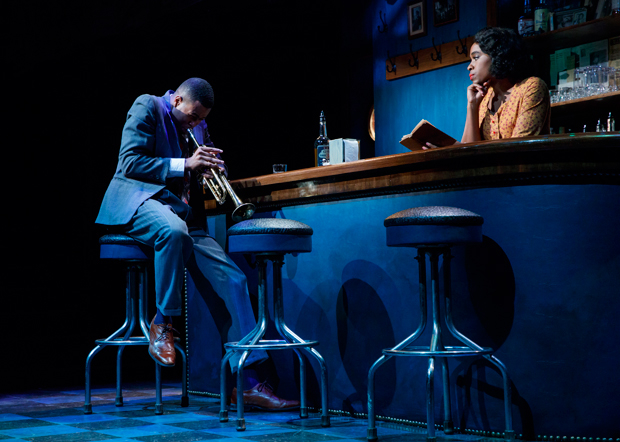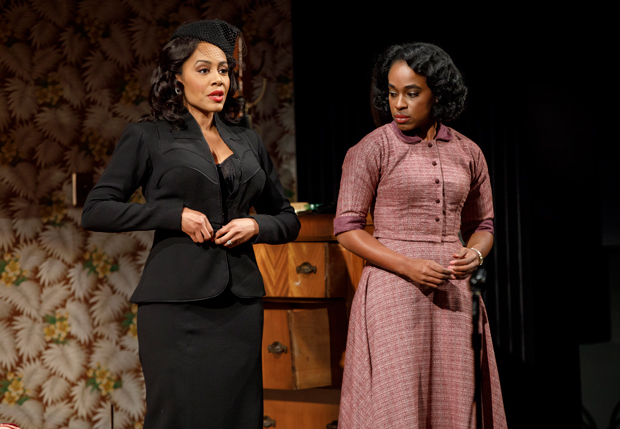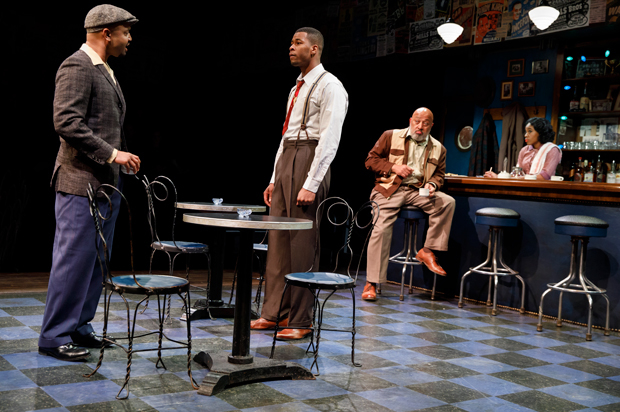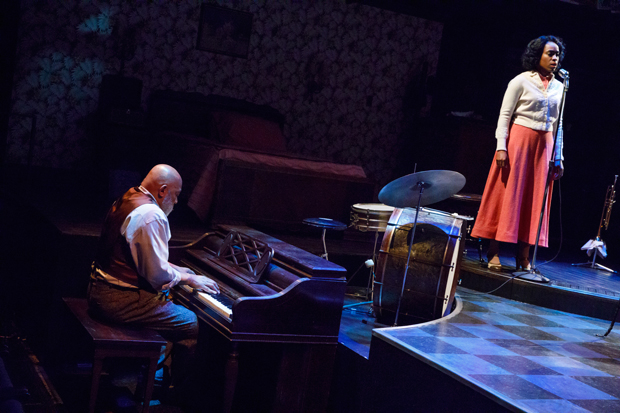Paradise Blue Examines a Black Community on the Brink in 1949 Detroit
Signature Theatre presents the New York premiere of Dominique Morisseau’s second “Detroit Project” play.

(© Joan Marcus)
Paradise Blue may be set in the world of jazz, but Dominique Morisseau's play, receiving its New York premiere in a new Signature Theatre production, feels less like an improvisatory jazz number than a tightly structured opera. Here, setups lead to inevitable payoffs (a Chekhovian gun is foreshadowed in its opening scene), and the cast of five divides neatly into thematic binaries: innocence vs. experience, repression vs. passion, authenticity vs. gentrification. That sense of freedom inherent in the most thrilling improvisations of Duke Ellington, Charlie Parker, Lester Young, and many of the other jazz greats whom Morisseau's characters cite is lacking in Morisseau's carefully cultivated world here.
To some degree, that sense of airlessness is appropriate to a play that is largely about people trapped, willingly or not, in particular environments and mindsets. As is the case with Morisseau's two other "Detroit Project" plays (Detroit '67 and Skeleton Crew), Paradise Blue is set in Detroit — specifically Blackbottom, a small black community that, as characters periodically hint at throughout the play, is on the verge of economic development and, thus, the destruction of its identity as a haven for African-Americans in 1949, a time still rife with racism. In this historical context, Paradise — the club owned by Blue (J. Alphonse Nicholson), himself a trumpeter — is itself a synecdoche for Blackbottom: an oasis from the troubled outside world…at least until a disrupting force, here represented by sultry femme fatale type, Silver (Simone Missick), arrives from New Orleans to shake things up.

(© Joan Marcus)
Before she eventually reveals a more mundane reason for her extended stay, Silver — who is rumored to have shot her last husband to death — functions primarily as a vampy representative of worldliness and proto-feminist agency. She seduces the club's house pianist, Corn (Keith Randolph Smith), dulling the flame he had still carried for his late wife. Silver's alluring manner certainly doesn't escape the eye of percussionist P-Sam (Francois Battiste), though he's more focused on other, more pressing club-related matters. But it's Silver's interactions with waitress Pumpkin (Kristolyn Lloyd), her meeker and plainer female counterpart in Paradise Blue, that make up the play's most memorable scenes. Pumpkin, who has spent all her life in Blackbottom and has previously shown no desire to leave, gradually becomes intrigued by Silver's sophisticated aura and sexually forward manner.
At the center of it all is Blue — at least ostensibly. But besides being a brusque, unsympathetic figure throughout, Blue is also saddled with a clichéd, barely sketched-in backstory involving familial trauma that dampens our interest in the character even as Morisseau tries to double down on his arc in the second act. (Nicholson's performance, somewhat one-note in its evocation of desperation and psychological torment, doesn't necessarily help matters, either.) Ultimately, Blue is less interesting as a character than as a thematic totem signifying the playwright's broad vision of a community forced, through a combination of shifting economic and social mores, to acknowledge and perhaps join the encroaching outside world.

(© Joan Marcus)
If the rest of the characters feel more deeply characterized, that may lie less in Morisseau's writing — which, even at its most eloquent, can't help but fully escape a touch of the schematic — than in the very fine actors who bring these ciphers to vivid life, delivering Morisseau's deliciously stylized lines of dialogue with astonishing naturalness. Witnessing the verbal tête-à-têtes between Battiste and Smith, in particular, becomes a pleasure in and of itself. Missick injects Paradise Blue with jolts of melting sensuality as Silver; it's easy to see why she exerts such a pull on the likes of the relatively straight-arrow Corn and Pumpkin. And Lloyd offers a palpably stark contrast to Missick in her portrayal of a character who finds herself wrestling internally with desires that she perhaps didn't realize she had before Silver came onto the scene.
Director Ruben Santiago-Hudson runs with the stylization in this production. Rui Rita's lighting casts the proceedings in a noirish glow, and Neil Patel's design of the Paradise Club embraces an open floor plan that tellingly eschews a wall between the main club floor and Silver's bedroom, thus intensifying a sense of characters with nowhere to hide emotionally. Kenny Rampton's original music — including lengthy instrumental preludes in each act — pays loving tribute to the jazz masters Blue reveres, but the most indelible bit of sonic stagecraft comes courtesy of sound designer Darron L. West, especially a scene during the increasingly surreal second act in which the sounds of trumpet music seem to literally attack Blue during a nightmare episode. Such a high level of visual and aural imagination helps Morisseau's flawed but worthy drama sing even when we sometimes find ourselves too conscious of the notes she's trying to hit.

(© Joan Marcus)









